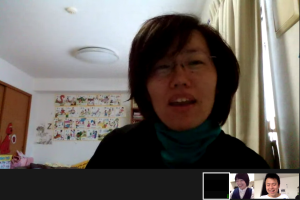この記事は次の言語でも読めます:日本語

We had our 11th Big Smile Online Gathering yesterday.
The topic this time is “special need education vs regular education.”
This time our guests are:
1. A Taiwanese scholar who studies rehabilitation counseling in the U.S.
2. A mother of a moon rider daughter in Japan
We shared our feedback on education based on our experience in each countries.
In Japan:
Special education schools have good resources and hardware for students in needs but parents worry about that sending kids to special educational schools may not help kids to integrate to the society after their education stage is completed.
Regular schools have limited resources, including limited hardware facilities and budget, allocated for students with special care needs.
We have shared a real life example in the session.
One school in Tokyo is only able to hire a supporter to support kids with disabilities 3 days a week.
The parents will have to arrange necessary supports for their kids for the rest 2 days of the week.
The expense is too high to bear so the mother decided to quit her job to support her daughter full time.
Regular schools sometimes will let the parents know that enrolling kids with disabilities in a special education institute is an option during the pre-enrollment.
In Taiwan:
The junior high school I attended in Taiwan has a program for students with learning disabilities.
Their class rooms are completely separated from the class rooms of regular students.
The teachers of the regular program do not talk about the students with learning disabilities at all.
Unfortunately, I never had the chance to understand the program and the students.
To me, the students with learning disabilities were mysterious.
In today’s session we are lucky to have a special education teacher who worked at a special education school in Taiwan.
She shared her opinion with us.
The special education school in Taipei is recently built so it is very accessible for students with wheelchairs.
She also said she thinks inclusion education is a better education option for students with disabilities so she and her colleagues will help the students in the special need education school to get in a regular school when the students move from one educational phase to the next, such as moving from junior high school to high school.
In USA:
Mizuki shared her recent 2 interviews with 2 schools, one is a public school, one is a non-profit school.
There are a very strict law called ADA (Americans with Disabilities Act) and it ensures all students have equal access to education.
The 2 schools Mizuki interviewed demonstrate very good examples of inclusion educations.
We have learned so much from each other.
Thank you, all the participants for spending your precious Friday night or Saturday morning with us.
Our next session is on the 20-November-2015, Friday, 9PM. (Japan Standard Time) It is on a Friday night in Japan.
The topic is “what are reasonable accommodations for people with disabilities at work?”
You can sign up here at
http://goo.gl/forms/rCYKNlqVqx
It would be wonderful to have you participating the session and sharing your ideas.
